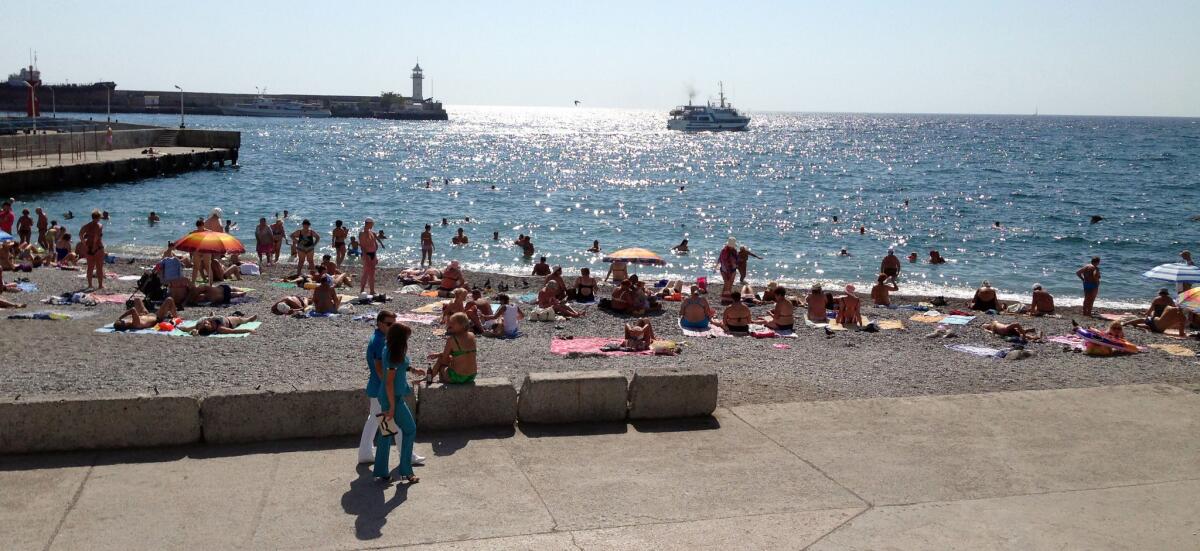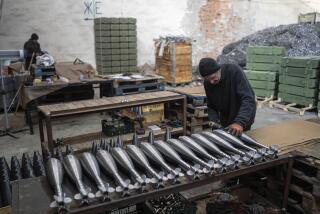In Russia-held Crimea, some prosper, others fear for their future

Six months after Ukraine’s Crimean Peninsula was annexed by Russia, some here say they have prospered while others express anger, uncertainty or fear.
The appropriation, which came less than two days after Crimean voters backed secession from Ukraine in a widely questioned referendum, has resulted in the adoption of the Russian ruble and the nationalization of assets and companies once owned by the Ukrainian state. Russia has also assumed responsibility for pensions, and businesses must register with Russian authorities.
------------
FOR THE RECORD
An earlier version of this post misspelled Tatars as Tartars.
------------
Some business owners said they are seeing positive financial results.
“As the owner of a private taxi, my business has grown,” said Vladimir Tolmachyov, 45, a retired army officer who voted in favor of Crimea becoming independent, which was followed closely by an accord signed between Russian President Vladimir Putin and Crimea’s new Moscow-backed leaders. “Many Russians always used to be interested in Crimea. Now [that] there’s are no customs procedures or border crossing, they can come.”
At Yalta’s Treasure Island restaurant, a harbor-side eatery offering vistas of sun-kissed beaches and the shimmering Black Sea, manager Stanislav Leonov said business was typically slow in August, just before the new school season. This year, though, the crowds did not diminish.
Replacing families were throngs of visitors from Russia, some from as far as Siberia, Leonov said.
“I’m sure it’s all due to patriotic feelings of coming back home,” the 32-year-old Yalta native said of the peninsula, which was ruled by Russia and the Soviet Union from the 18th century until it was transferred to Ukraine in 1954. “Before, people did not have the motivation. Now they do. Crimea has always been a multinational territory, but it’s always been Russia.”
Svetlana Makas, a tour operator, said earnings have climbed as the price of boat excursions has increased. The ticket for a 45-minute tour has more than doubled to about $10. This year she expects to pull in $12,000, about twice what it was under the Ukrainian government.
Heartened by the increase in salaries, Makas said she planned to return to her previous profession as a senior state administrator. Under Ukraine, that job paid about $190 a month. Now, Makas, who has 10 years of experience and two university degrees, says she could earn about $1,600 a month.
But vendor Marina Kolmakova, who sells soft drinks, snacks and ice-cream from a kiosk close to the harbor, said that salaries are not rising enough to keep pace with price increases for goods and services.
“The season is weaker than before,” Kolmakova, 47, said. “Last year people just bought without inquiring about prices. Now they ask.”
Although many supporters of Russian authority in Crimea point to positive changes, the new authority has not been welcomed by the region’s ethnic Tatar community, which has strong reservations. In Takhta-Dzhami, a Tatar village around 45 miles north of Yalta, fear and apprehension outweigh joy and satisfaction.
“Our people, we don’t know what awaits us tomorrow,” said Abide Sidarova, until recently the local council representative for the settlement of 800 residents. “We are worried about the whole situation. We need time to think. We have to compare the life we had before in Ukraine and the new conditions.”
Takhta-Dzhami was created 23 years ago with the breakup of the Soviet Union and the return of thousands of Tatars who had been deported to Uzbekistan in 1944 by Soviet dictator Josef Stalin. Their suffering is well-documented and there is concern that it could be starting again.
“We were used to freedom of speech in Ukraine,” Sidarova said. “We would have peaceful rallies. Now we are banned from doing this.”
On May 18, the community was not given permission to commemorate Crimea Tartar Memorial Day, marking the 70th anniversary of the deportation, Sidarova said. But several people gathered anyway under the watchful eye of military helicopters.
Then, on June 26, they were banned from celebrating the annual Tatar Flag Day, and another remembrance rally early that month was also prohibited. In recent weeks, Tatar homes and mosques have been searched by Russian security service, Sidorova said.
“We Crimea Tatars are tolerant, friendly and hardworking,” she said. “We obey the law but we feel the authorities don’t trust us.”
“It’s terrible,” said Takhta-Dzhami resident Lilya Asanova, 49, as she shopped for groceries one recent afternoon. “Our rights are being violated. We hated the Stalin regime and ... Putin is walking the same path as Stalin.”
Asanova said she feared that her sons might be forced to fight for Russia. Ukraine abolished mandatory conscription last year, but Russia still has the draft.
“Ukraine was closer to us,” Asanova said. “We were treated well and regarded well by Ukraine. In Ukraine I knew what the fate of my children would be.”
The stress is particularly poignant among the elderly.
Elyame Kurtmulayeva, 73, remembers the old days. Her family was deported. There were four children. She was the only one to survive. Her 6-month-old sister died during the grueling train journey to Uzbekistan. The Soviet authorities simply tossed the corpse out the window, Kurtmulayeva said.
“We suffered in Uzbekistan,” said the matriarch, affectionately called Grandma Emma.
When the Tatars returned to their Crimean homeland in the early 1990s, Ukraine welcomed them back.
“Ukraine gave us plots of land. We love Ukraine so much,” said Kurtmulayeva. “But how will it be with Russia? Russia did nothing for us. We are waiting for Ukraine to take us back.”
Her daughter-in-law Elmira Kurtmulayeva, 42, and her husband run a small grocery store in the village. The younger Kurtmulayeva said the cost of some of her products had doubled since Crimea came under Russian control, and the assortment of products was now limited because she was no longer allowed to buy certain goods from Ukraine. In recent weeks the popular Chernigivske Ukrainian beer was banned and a more expensive Russian version of the same lager had replaced it, Kurtmulayeva said.
The highest denomination of the Ukrainian currency, the hryvnia, is 500. “Now everything is measured in thousands,” the biggest bill in Russian rubles, said Sidorova, the council deputy.
At the end of the year, Kurtmulayeva will have to reregister the family business as a Russian enterprise. Her mother-in-law has already received a Russian passport. The shopkeeper and her husband have applied for the travel document.
It’s one formal step toward accepting what seems to be irreversible: Russian rule in Crimea.
“Our people lived in Uzbekistan and Ukraine and we are grateful to them, “ Sidorova said. “Now we need more time to get used to Russia. We can’t just wake up one morning and become Russian patriots.”
More to Read
Sign up for Essential California
The most important California stories and recommendations in your inbox every morning.
You may occasionally receive promotional content from the Los Angeles Times.










